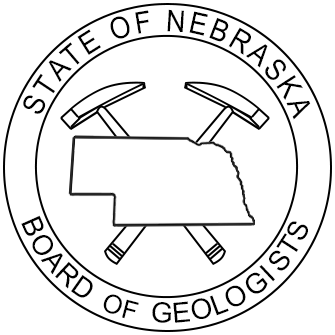Experience
Applicants for initial licensure as licensed professional geologists in Nebraska are required to have a minimum of five years of progressive geologic experience at the time the application is submitted. Experience is calculated on the following:
- Each full-time month of experience that was carried out for a client, under the direct supervision of a licensed professional or qualified geologist, or under another professional who has a similar experience, education, and professional character in a related field will count as one month of geologic work.
- Part-time work may be converted to its full-time equivalent.
- Successful completion of a Master’s degree in geology may be used for one year’s experience credit. A PhD in geology may be credited for two years of experience. If the PhD is obtained without the Master's degree, the credit will be two years.
- Experience may either be gained under the education or the work experience category. The applicant cannot claim the experience for completion of a graduate degree and work experience while working full time during the same time period.
The following is offered as a guideline in determining if an applicant’s experience is geologic in nature.
Geologic work involves the analysis and representation of natural earth materials (e.g., rock, soil, sediment, water, and economic minerals), the earth processes that act on them, and the history of the planet and its life forms. Training in the subjects necessary to perform such work is demonstrated by the completion of at least 5 of the following 7 core courses: physical geology, mineralogy petrology/petrography, stratigraphy/sedimentology/soils, structural geology, summer field geology, and hydrogeology which lead to a degree in geology or a geologic specialty.
The geologic nature of your work is demonstrated by the results you produce, including (but not limited to):
- Geologic maps showing the distribution, age, and character of surface materials
- Geologic cross-sections interpreting subsurface stratigraphic and/or structural relationships
- Three-dimensional interpretations (e.g., structural block diagrams, groundwater flow models)
- Technical reports summarizing geologic data and recommending a course of action to a company or client
- Drilled oil prospects (and production figures, if successful)
- Operating a mine or quarry (with production figures)
- Peer-reviewed journal articles or book chapters; or a thesis or dissertation accepted as part of a graduate degree
- Presentations at national, regional, or state-wide professional meetings with published abstracts
- Lists of courses taught as part of a teaching assistantship held during the pursuit of a graduate degree in geology or related specialty including credit hour production and number of times taught
- Reports or publications resulting from research performed while seeking a graduate degree in geology or a related specialty, and independent research resulting in a specific product
- Geologic results while in responsible charge or during technical oversight and supervision
Geologic work that may not be Professional Level and will be evaluated on a case-by-case basis:
- Multi-authored technical reports – some companies follow the practice of putting everybody’s name on a report if they had anything to do with its production. Only those people who performed the geologic component of work should count this type of publication. Give the percent of the work you personally completed, and describe the geologic character of your contribution.
- Mud logging – in itself is not “geologic” work since many companies do not require a college degree or even any training in geology for mud loggers. However, if you are describing formations or identifying pay zones by their geologic character, you would be considered a well-site geologist. Ask your supervisor to clarify this in the letter of reference.
- Geotechnical work – like mud logging, this is not “geologic” work since a baccalaureate degree in geology is not required. Only activities requiring training in the required geologic core courses are considered to represent geological work of a professional nature. Ask your supervisor to clarify this in the letter of reference.
- Teaching – teaching at the K-12 level does not qualify as professional geologic experience since it can be performed without a geology degree.
- Incidental skills – many geologists perform activities that are incidental to their geologic duties that do not require knowledge based on the required geologic core courses. Examples include surveying, drafting, assisting with or drilling water wells, opening water wells, or collecting water samples or well cuttings. If your work consists mainly of these types of activities, then it's professional geologic experience.
- Management – supervising geologists in itself is not a geologic experience. You should be able to demonstrate personal involvement in producing the geologic product, either as pre-management level training or as a geologic team member.
